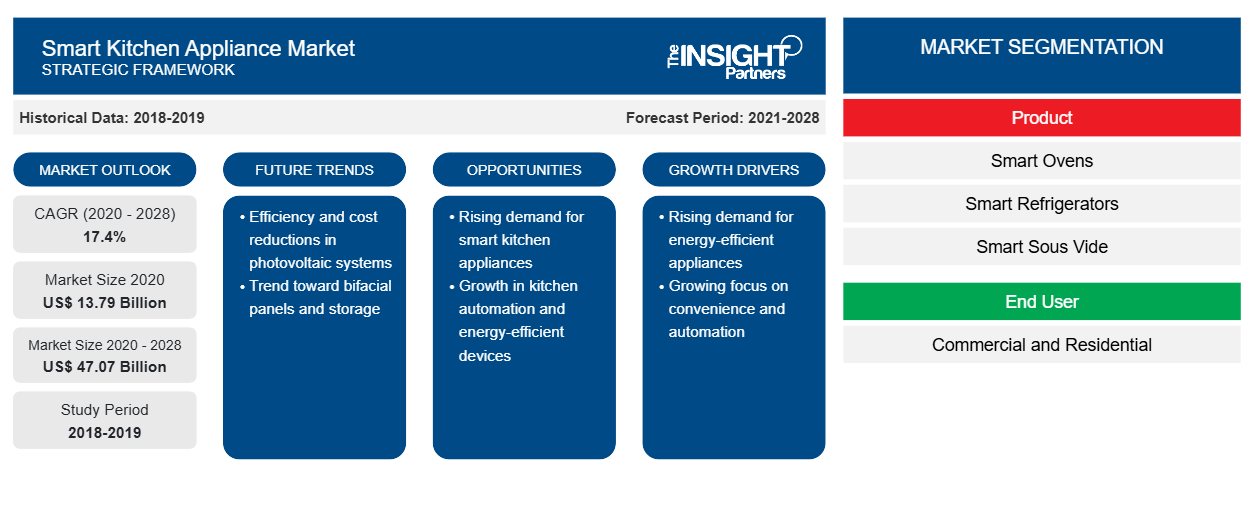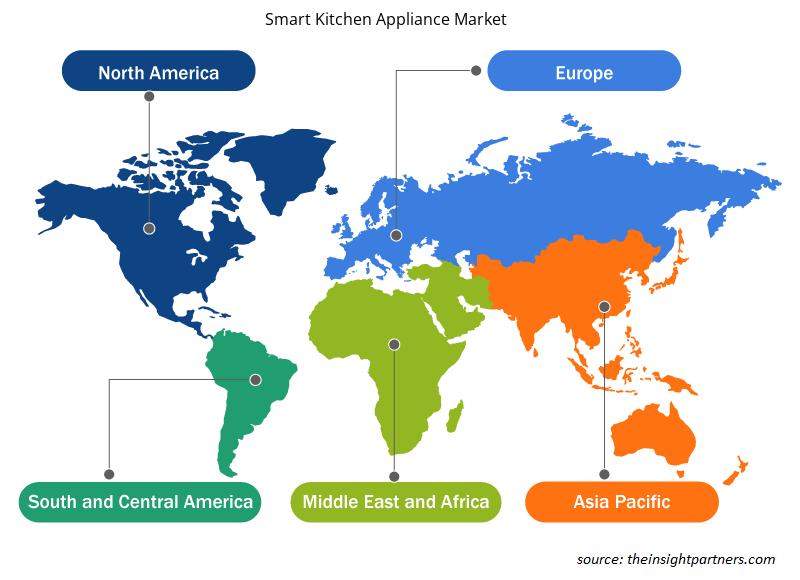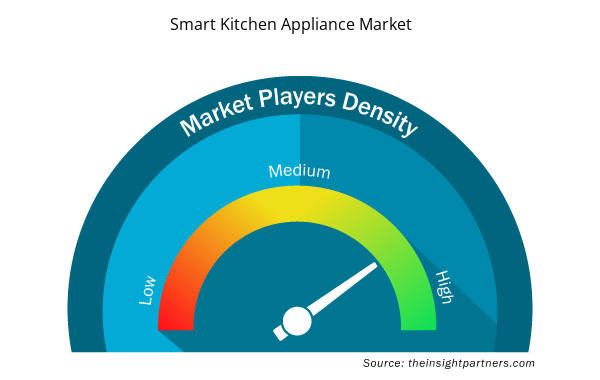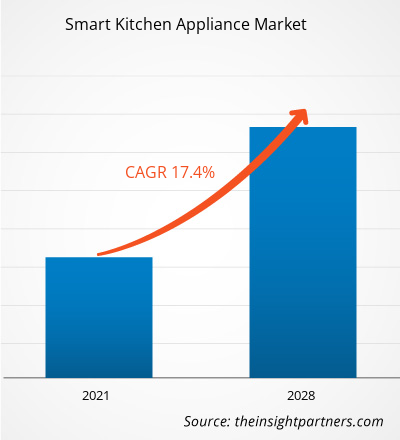The global smart kitchen appliance market is expected to grow from US$ 13,786.0 million in 2020 to US$ 47,071.2 million by 2028; it is estimated to register a CAGR of 17.4% during 2020–2028.
Cost-Effectiveness and Communication Ability of Smart Kitchen Appliances
Smart kitchen appliances are recently innovated technologies that are gaining prominence substantially in developed and developing nations. According to the Cisco Internet Report, connected homes will hold a share of 48% across all Internet of Things (IoT) applications. Smart kitchen appliances offer several benefits such as cost-effectiveness, communication ability, safety, and convenience to the owners, thereby gaining traction among end users.
The initial investments toward the procurement of smart kitchen appliance are on the higher side. However, these appliances help customers reduce recurring costs associated with periodic maintenance and energy consumption in the long run. Traditional or modern electronics or electrical appliances conserve less energy but require periodic maintenance and incur high costs. The integration of sensor technologies in smart kitchen appliances enables the devices to sense the performance and alert the owners in case of any faults. This factor reduces repetitive costs. For instance, LG ThinQ is a smartphone application offered by LG Electronics for its smart appliances. The smart appliances are powered by self-diagnosis features, and diagnosis results can be accessed by end users using LG ThinQ application. Further, the application provides necessary troubleshooting instruction to users to diagnose problems, which eliminates the need to contact repair personnel for minor issues. The reduction in recurring expenses is facilitating several end users to procure these smart kitchen appliances.
Similarly, another advantage of smart kitchen appliances is the ability to communicate over wireless networks. These kitchen appliances can communicate with each other and with the owner through the owner's smartphones. Smart technologies enable owners to control, monitor, and access the appliances remotely. Smart kitchen appliances such as smart ovens allow the owner to switch off or on the stove from the owner's smartphone, which increases convenience. This benefit is increasing their demand among end users. Also, with the integration of various sensors and built-in cameras, smart refrigerators facilitate the owner to update the shopping list.
Additionally, smart refrigerators have screens that are used as notepads and to check the temperature and energy consumption pattern. The owners of smart refrigerators can easily control and manage the refrigerators according to the refrigerator's performance and switch between various modes through smartphones. These advantages of smart refrigerators allow customers to procure smart refrigerators for commercial and residential purposes, thereby boosting the growth of the smart kitchen appliance market
Customize This Report To Suit Your Requirement
You will get customization on any report - free of charge - including parts of this report, or country-level analysis, Excel Data pack, as well as avail great offers and discounts for start-ups & universities
Smart Kitchen Appliance Market: Strategic Insights

- Get Top Key Market Trends of this report.This FREE sample will include data analysis, ranging from market trends to estimates and forecasts.
Customize This Report To Suit Your Requirement
You will get customization on any report - free of charge - including parts of this report, or country-level analysis, Excel Data pack, as well as avail great offers and discounts for start-ups & universities
Smart Kitchen Appliance Market: Strategic Insights

- Get Top Key Market Trends of this report.This FREE sample will include data analysis, ranging from market trends to estimates and forecasts.
Impact of COVID-19 Pandemic on Smart Kitchen Appliance Market
According to the Electronic Components Industry Association, COVID-19 caused delay and disruption in the supply chain, product releases, events, and other industry-related activities. Several electronics manufacturers had to temporarily cease their manufacturing units due to containment measures and limited availability of components and raw materials. Further, the manufacturers of various electronic and semiconductor products, including smart kitchen appliances, had experienced a delay in stipulated timelines, which negatively affected the supply chain of the smart kitchen appliance market. However, the supply chain of the smart kitchen appliance market started to stabilize in late Q4 of 2020, as economics reopened and the market gained positive momentum from 2021.
Smart Kitchen Appliance Market Insights
Substantial Growth in Smart Home and Smart Hotel Projects
The global construction sector is witnessing substantial demand for connected homes with technologically advanced appliances and devices. Developed countries such as the US and the UK and developing countries such as China, Japan, and South Korea have made interesting strides in smart home developments. The US market has witnessed substantial growth in the number of smart homes, and the country is expected to experience similar trends in the coming years. The rapid shift in the mindsets of the US population is heavily impacting the growth of smart home appliances such as smart speakers, smart thermostats, smart lighting, and smart security devices. According to Alarm.org, 57% of Americans admitted that by using smart products, they could save ~30 minutes of their time. ~47% of millennials are using smart home products. The adoption of these devices is continuously rising in the US and globally. The penetration of these smart devices opens the growth avenues for smart kitchen appliances, as these appliances are among the necessary household items. Due to the change in the mindset of the global population, majorly among the people in developed countries and a few developing countries, the future of smart kitchen appliance is expected to be prominent.
Also, the hospitality industry in various geographies is procuring robotic technologies and connected technologies to enhance customer satisfaction. Smart TVs, voice-controlled rooms, robotic luggage storage, and digital concierge are a few of the prominent smart hotel technologies in the current times. Various hotel managements are showcasing decent interest in transforming their kitchens into smart kitchens with the procurement of smart kitchen appliances. The integration of cloud-based technologies and smartphones enables hotels and restaurant owners to remotely control and monitor their commercial kitchen appliances, facilitating the progression of the smart kitchen appliance market in the current scenario.
Product-Based Market Insights
Based on product, the smart kitchen appliance market is segmented into smart ovens, smart refrigerators, smart sous vide, smart juicers & blenders, smart cooker & cooking robots, smart cooktops, smart & integrated ovens & cooktops, and others. The smart refrigerators segment led the smart kitchen appliance market with a share of 33.0% in 2020. The smart kitchen appliance market is witnessing a surge due to significant demand for smart refrigerators and smart ovens in the developed and developing countries, improved lifestyle, enhanced internet infrastructure, substantial growth in Internet of Things (IoT), and a rise in demand for connected devices or appliances in residential and commercial kitchens.
The smart refrigerators segment captured the largest share in the global smart kitchen appliance market in 2018 and is expected to dominate the market during 2021–2028 On the other hand, the demand for smart ovens is foreseen to grow significantly over the years, thereby projecting a promising future for the segment from 2021 to 2028.
Connectivity-Based Market Insights
Based on connectivity, the smart kitchen appliance market is segmented into Wi-Fi and Bluetooth. The Wi-Fi segment led the smart kitchen appliance market with a share of 77.3% in 2020. Further, it is expected to garner a 79.0% share by 2028.
Kitchen appliances are increasingly becoming intelligent with the amalgamation of advanced sensors, interactive display panels, cameras, and other technologies. The integration of these technologies has facilitated manufactures to gain significant customer attraction and revenue. This has enabled manufacturers to upgrade their product lines with additional technologies such as Wi-Fi connectivity technology.
Wi-Fi has become an essential household component nowadays across geographies. The manufacturers of smart kitchen appliances are increasingly integrating their products with Wi-Fi-enabled connectivity technology solutions, which allow owners to operate and monitor their cooking appliances from remote locations. Wi-Fi-enabled smart cooking appliances help the owner to control and monitor two major parameters—temperature and time. These benefits have influenced residential and commercial end users to procure smart kitchen appliances with Wi-Fi connectivity technology. Increasing procurement resulted in market growth. Rapidly improving internet infrastructures plays a critical role in the growth of Wi-Fi-enabled smart kitchen appliances. According to the Cisco Annual Internet Report, IoT devices will account for 50% of all networked devices and approximately one-third will be wireless. This factor is anticipated to fuel the growth of smart kitchen appliances with Wi-Fi connectivity technology in the forthcoming years.
Smart ovens, smart refrigerators, smart cooktops, smart coffee vending machines, and smart juicers & blenders are among the Wi-Fi-enabled smart kitchen appliances available in the market. The increasing demand from consumers to integrate kitchen appliances with Wi-Fi connectivity technology is propelling the assimilation of Wi-Fi connectivity technology in smart kitchen appliances. This factor is a key catalyst for the Wi-Fi-enabled smart kitchen appliance market in the current scenario.
Smart Kitchen Appliances Smart Kitchen Appliance Market Regional Insights
The regional trends and factors influencing the Smart Kitchen Appliance Market throughout the forecast period have been thoroughly explained by the analysts at Insight Partners. This section also discusses Smart Kitchen Appliance Market segments and geography across North America, Europe, Asia Pacific, Middle East and Africa, and South and Central America.

- Get the Regional Specific Data for Smart Kitchen Appliance Market
Smart Kitchen Appliance Market Report Scope
| Report Attribute | Details |
|---|---|
| Market size in 2020 | US$ 13.79 Billion |
| Market Size by 2028 | US$ 47.07 Billion |
| Global CAGR (2020 - 2028) | 17.4% |
| Historical Data | 2018-2019 |
| Forecast period | 2021-2028 |
| Segments Covered |
By Product
|
| Regions and Countries Covered | North America
|
| Market leaders and key company profiles |
Smart Kitchen Appliance Market Players Density: Understanding Its Impact on Business Dynamics
The Smart Kitchen Appliance Market market is growing rapidly, driven by increasing end-user demand due to factors such as evolving consumer preferences, technological advancements, and greater awareness of the product's benefits. As demand rises, businesses are expanding their offerings, innovating to meet consumer needs, and capitalizing on emerging trends, which further fuels market growth.
Market players density refers to the distribution of firms or companies operating within a particular market or industry. It indicates how many competitors (market players) are present in a given market space relative to its size or total market value.
Major Companies operating in the Smart Kitchen Appliance Market are:
- AB Electrolux
- Breville Group Limited
- BSH Hausgerate GmbH
- GE Appliance
- LG Electronics inc.
Disclaimer: The companies listed above are not ranked in any particular order.

- Get the Smart Kitchen Appliance Market top key players overview
Players operating in the smart kitchen appliance market adopt strategies such as mergers, acquisitions, and market initiatives to maintain their positions in the market. A few developments by key players are listed below:
- In November 2019, Electrolux expanded its collaboration with Google by integrating connected kitchen products in Europe with the Google Assistant, enabling consumers to control products via voice commands.
The global smart kitchen appliance market is segmented into product, end user, and connectivity. Based on product, the smart kitchen appliance market is segmented into smart ovens, smart refrigerators, smart sous vide, smart juicers & blenders, smart cooker & cooking robots, smart cooktops, smart & integrated ovens & cooktops, and others. Based on end user, the market is categorized into commercial and residential. By connectivity, the smart kitchen appliance market is segmented into Wi-Fi and Bluetooth.
Electrolux AB; BSH Hausgeräte GmbH; GE Appliances; LG Electronics; Koninklijke Philips N.V.; Panasonic Corporation; Samsung Electronics Co., Ltd; Breville Group Limited; Whirlpool Corporation; and Vita-Mix Corporation are the key smart kitchen appliance market players considered for the research study. In addition, several other significant smart kitchen appliance market players have been studied and analyzed in this research report to get a holistic view of the global smart kitchen appliance market and its ecosystem.
- Historical Analysis (2 Years), Base Year, Forecast (7 Years) with CAGR
- PEST and SWOT Analysis
- Market Size Value / Volume - Global, Regional, Country
- Industry and Competitive Landscape
- Excel Dataset



Report Coverage
Revenue forecast, Company Analysis, Industry landscape, Growth factors, and Trends

Segment Covered
Product, by End User, and Connectivity

Regional Scope
North America, Europe, Asia Pacific, Middle East & Africa, South & Central America

Country Scope
Argentina, Australia, Brazil, Canada, China, France, Germany, India, Italy, Japan, Mexico, Netherlands, Poland, Russian Federation, Saudi Arabia, South Africa, South Korea, Spain, Sweden, United Arab Emirates, United Kingdom, United States
Frequently Asked Questions
growth in internet penetration and awareness related to the smart kitchen appliances among the population in developing countries are helping customers in these regions to procure an increased number of smart kitchen appliances, thereby, creating growth opportunities for the smart kitchen appliances market players.
The connected home devices industry has witnessed significant growth across the globe in the current scenario, and the same is expected to be adopted in large quantities in the coming years. Several manufacturers of electronics and electrical equipment are increasingly emphasizing on the development of smart kitchen appliances to benefit their customers with advanced technologies. The presence of long-established and industry recognized manufacturers in the smart kitchen appliance market is facilitating the market to proliferate quickly. Additionally, rising disposable income among the middle-class societies in developed countries and developing countries is influencing the residential end users to adopt newer technologies such as intelligent kitchen appliances, which is paving the growth path for smart kitchen appliance market.
The major companies in smart kitchen appliances includes Whirlpool Corporation; Breville Group Limited; Samsung Electronics Co., Ltd.; Electrolux AB; and BSH Hausgeräte GmbH.
The smart refrigerator is expected to dominate the market during the forecast period. Smart refrigerators are also known internet refrigerators which are embedded with advanced technologies to sense the stored products and keep a track of the stock of products. The ability to communicate with the end users is a prime benefit of smart refrigerators. Various smart refrigerators have large screens which facilitate as note pads, calendar, leave notes, internet browsing, voice assistance, and playing music among others. Also, smart refrigerator allows end user to track the checks expiration dates of most of groceries and also suggests recipes according to groceries available in refrigerator. The sensors embedded in these refrigerators also senses the temperatures outside and inside the fridge,and adjusts the temperatures inside the refrigerators. Additionally, in case of any malfunction, the refrigerators alert the owner immediately which simplifies operational maintenance.
The Wi-Fi is expected to dominate the market during the forecast period. Wi-Fi has become an essential household component nowadays across geographies. Pertaining to this, the manufacturers of smart kitchen appliances are increasingly integrating their products with Wi-Fi enabled Connectivity Technology solutions, which facilitates the owner’s to operate and monitor their cooking appliances from a remote location. Wi-Fi enabled smart cooking appliances helps the owner to control and monitor two major parameters namely; temperature, and time. These benefits have influenced both residential and commercial end users to procure smart kitchen appliances with Wi-Fi Connectivity Technology. Increasing procurement has resulted in market growth. Rapidly improving internet infrastructures in developed countries and developing countries is playing a crucial role in growth of Wi-Fi enabled smart kitchen appliances. According to Cisco Annual Internet Report, IoT devices will account for 50 percent of all networked devices and approximal one-third will be wireless. This factor is anticipated to fuel the growth of smart kitchen appliances with Wi-Fi Connectivity Technology in the forthcoming years.
In 2020, APAC accounted for the highest market share in the global market and is also expected to grow with the highest CAGR over the forecast period.
Trends and growth analysis reports related to Electronics and Semiconductor : READ MORE..
The List of Companies - Smart Kitchen Appliance Market
- AB Electrolux
- Breville Group Limited
- BSH Hausgerate GmbH
- GE Appliance
- LG Electronics inc.
- Panasonic corporation
- KONINKLIJKE PHILIPS N.V.
- Samsung electronics Co., Ltd.
- Vita-Mix Corporation
- Whirlpool Corporation

 Get Free Sample For
Get Free Sample For